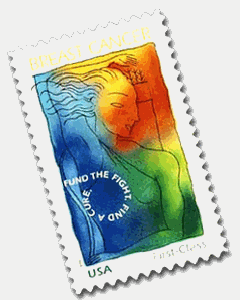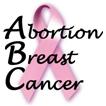Postage Stamp
Postage Stamps
Cancer Treatment is More Profitable than Cancer Prevention
The United States Post Office is selling 37 cent stamps for 45 cents in order to raise funds for breast cancer research. Dr. Joel Brind, president of the Breast Cancer Prevention Institute, says that he won't buy these stamps sold by the U.S. Postal Service. Here is his explanation:
"The profits go to the National Cancer Institute (NCI), our own federal agency charged with leading the 'war on cancer'. It's the same NCI--regrettably--that has spearheaded the cover-up of the most avoidable risk factor for breast cancer: abortion. Shame on them."
Cancer research is necessary, but it wouldn't be quite so necessary if the cancer establishment pursued disease prevention. Cancer treatment is far more profitable than cancer prevention is.
A boycott of the postage stamp does not mean that women's needs will be abandoned. There are other organizations which conduct research and focus on cancer prevention, such as the Breast Cancer Prevention Institute and the Polycarp Research Institute.
Other Medical Experts Criticize the Cancer Establishment
Samuel Epstein, University of Illinois professor emeritus of public health, and Dr. Quentin Young, past president of the American Public Health Association, publicly criticized the NCI and the American Cancer Society in a commentary published in the Los Angeles Times on August 31, 2003. They said:
"A recent government analysis of leading causes of mortality in the U.S. from 1973 to 1999 revealed that, although the percentage of the population dying from heart disease decreased by 21 percentage points during the period, cancer deaths increased by 30 percentage points. Some 1.3 million Americans are found to have cancer each year, and more than half a million die from it.
"Paradoxically, it seems that the more we spend on cancer research, the more cancer we get. The steep rise in disease comes alongside a far steeper rise in the NCI's budget, which has shot up from $150 million in 1970 to its current $4.6 billion."
In the case of breast cancer, one might add that the more money the public gives to the cancer fundraising industry, the more women there are who develop the disease. In 1970, one in 12 women were expected to develop breast cancer. In 2004, more than 1 in 8 women will be diagnosed with it. The American Cancer Society expects 216,000 new cases of invasive breast cancer and 59,000 cases of in situ breast cancer in 2004.
If the cancer establishment were truly interested in reducing breast cancer rates, it would have exhibited an interest in preventing the disease. The best way to prevent breast cancer (and cut breast cancer rates by more than one-half) is to have more children, starting before age 24, and breastfeeding them longer.
If women's lives mattered more than fundraising and protecting the abortion and the pharmaceutical industries, then the cancer fundraising industry would have long ago fingered abortion as one of the culprits responsible for these recognized reproductive risk factors - childlessness, decreased childbearing, delayed first birth, and little or no breastfeeding.
If women's lives mattered, then women would have been told in 1986 when U.S. government scientists admitted that abortion is an independent cause of breast cancer. [Stadel B, Wingo P, et al. Letter to editor, Lancet, Feb. 22, 1986, p. 436]
While discussing occupational and environmental exposure to carcinogens, Epstein and Young criticized the cancer establishment for having "suppressed evidence of causation that it had in its possession."
"The NCI's apparent lack of interest in prevention," said Epstein and Young, "is institutionally embedded." They added that, "The American Cancer Society's strong support from industry is reflected in its research choices, which are overwhelmingly aimed at treatment. As the Chronicle of Philanthropy, the nation's leading charity watchdog, put it in a January 1992 article, 'The ACS is more interested in accumulating wealth than saving lives.' The NCI's prevention budget is, at first glance, less parsimonious."
Finally, Epstein and Young were critical of the NCI and the American Cancer Society for its ties to industry. They criticized the American Cancer Society for accepting large donations (in excess of $100,000 yearly) from polluting chemical companies, petroleum companies and cancer drug manufacturers.
The Coalition on Abortion/Breast Cancer and the Breast Cancer Prevention Institute have made similar accusations against the cancer establishment for covering up the abortion-breast cancer (ABC) link for a half-century.
A criminal investigation should be conducted into the agency's egregious conduct.
Find out how the NCI's leaders used their political and scientific skills to cover-up the ABC link by visiting this link: click here


